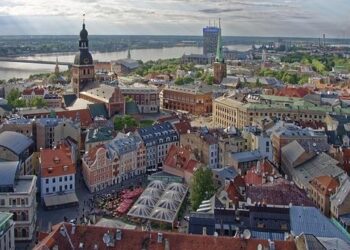Following the recent closure of its airspace, Latvia is now deliberating the possibility of a full border shutdown with neighboring Russia and Belarus. This move comes amid escalating regional tensions and security concerns, signaling a significant shift in the Baltic nation’s approach to its eastern frontiers. Ukrainian National News reports that Latvian authorities are weighing stringent border controls as part of broader efforts to reinforce national security and respond to the evolving geopolitical landscape.
Latvia Weighs Full Border Shutdown with Russia and Belarus Amid Airspace Closure
Latvian authorities are contemplating a complete shutdown of border crossings with Russia and Belarus following the recent closure of national airspace to these neighboring countries. This measure aims to intensify security protocols amid rising geopolitical tensions in the region. Officials have highlighted concerns over unauthorized crossings and the potential for increased smuggling activities, prompting discussions to bolster border controls and limit entry points significantly.
Key considerations for this decision include:
- Enhanced surveillance: Deployment of advanced monitoring technologies along vulnerable stretches of the border.
- Increased border patrols: Augmented presence of security personnel to prevent illegal crossings.
- Economic impact assessment: Analysis of how border restrictions could affect trade and transit routes.
| Border Crossing | Status | Recent Activity |
|---|---|---|
| Terehova | Open | High traffic, security checks intensified |
| Paternieki | Restricted | Delays reported due to enhanced inspections |
| Grńęva | Closed (proposed) | No traffic, under consideration for full closure |
Strategic Implications for Regional Security and Cross-Border Trade
Closing the border with Russia and Belarus would mark a significant shift in Latvia’s approach to regional security, underscoring an increasingly cautious stance amidst ongoing geopolitical tensions. Such a move aims to curb potential escalations by limiting unauthorized crossings and reducing the risk of covert operations or smuggling activities. This heightened perimeter control could strengthen Latvia’s defensive posture but also demands substantial allocation of resources to ensure effective monitoring and enforcement.
From an economic perspective, the potential closure poses immediate challenges for cross-border trade, deeply intertwined with Latvia’s supply chains and local businesses. Key impacts include:
- Disruption of Transit Routes: Especially affecting goods traveling between the Baltics and Eastern Europe.
- Increased Logistics Costs: Rerouting cargo and extended customs checks may inflate operational expenses.
- Supply Chain Bottlenecks: Critical industries dependent on materials from Russia or Belarus could face delays.
| Aspect | Security Impact | Trade Impact |
|---|---|---|
| Border Control | Enhanced surveillance and patrols | Longer customs processing times |
| Logistics | Reduced infiltration risks | Alternate routes needed, higher costs |
| Local Economy | Stronger defense posture | Potential downturn in border communities |
Experts Recommend Strengthened Diplomatic Measures and Enhanced Border Controls
Leading diplomatic analysts have emphasized the urgent need for Latvia to adopt more robust diplomatic strategies in light of the escalating regional tensions. Strengthening dialogue with European Union partners, NATO allies, and neighboring states is crucial to coordinate a unified response and exert pressure on Russia and Belarus. Experts argue that without a cohesive international stance, unilateral efforts may fall short of deterring further provocations.
Simultaneously, border security agencies are urged to implement enhanced control protocols to mitigate potential risks. Recommendations include:
- Increased patrol frequency along critical border segments
- Deployment of advanced surveillance technologies such as drones and thermal sensors
- Expanded intelligence sharing mechanisms between Latvia and regional security partners
- Comprehensive screening procedures for all border crossers to prevent infiltration
| Measure | Projected Impact |
|---|---|
| Joint EU-NATO Diplomatic Efforts | Increased political pressure on involved states |
| Surveillance Tech Deployment | Enhanced detection of unauthorized crossings |
| Intelligence Sharing | Faster response times to emerging threats |
| Comprehensive Screening Procedures | Reduced risk of infiltration by hostile actors |
The Conclusion
As Latvia contemplates a full closure of its border with Russia and Belarus following the recent airspace restrictions, the move signals a significant escalation in regional security measures amid ongoing geopolitical tensions. The decision, still under consideration by Latvian authorities, reflects growing concerns over national sovereignty and the broader implications for European stability. Observers will be closely monitoring developments as Latvia navigates the delicate balance between safeguarding its borders and maintaining diplomatic channels in an increasingly complex environment.
















